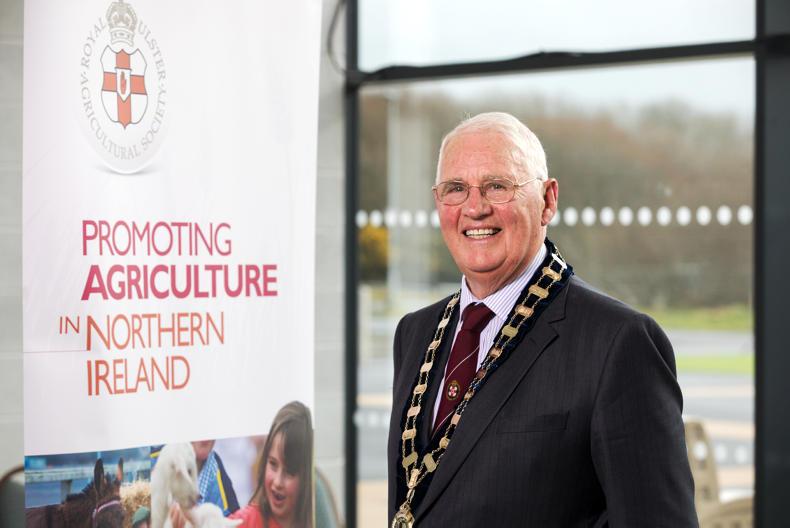The organisation behind Balmoral Show, the Royal Ulster Agricultural Society (RUAS), elected Billy Martin as its president for a two-year term in March 2019.
Billy has a wealth of experience in leading farming organisations in Northern Ireland, having been on the RUAS council since 1973. He was also president of the Young Farmers Clubs of Ulster in the mid-1970s and was Ulster Farmers Union president from 1985 until 1986.
The Balmoral Show is now in full swing and runs until 18 May. The event, which is renowned for showcasing the very best of Northern Ireland farming, food and equine, is something that Billy is proud to have seen develop over the years.
Home for Billy is on the Ards Peninsula in Co Down, where he farms with his son John, who is also well known in farming circles, most recently for winning the Ulster Grassland Farmer of the Year competition in January 2019.

“We have over 160 acres, almost 40 acres of willows for biomass and the rest is mainly grassland, but we grow some barley to feed our livestock. John, my eldest son, works along with me on the farm and we’ve a part-time employee.
“About 15 years ago we were buying in Suffolk Cheviot hoggets and doing experimental work with the Agri-Food and Biosciences Institute(AFBI). We discovered that each year the weight of the Suffolk-Cheviot ewes was about 115kg. We had 500 ewes at that time, which meant over 50t of mutton was walking the land and had to be kept when there were no lambs. The lambing percentage sold was about 150%.
“Then we started to cross Suffolk-Cheviots with Lleyn rams. We followed that through using New Zealand genetics and then using Belclare (rams) from Galway. We’re now using Aberfield genetics to breed replacements. We’ve used New Zealand terminal sires and Meatlinc as well, and that went very well.
“We reduced the average weight of our ewes to 70–75kg. We’re carrying 600–700 ewes in the same area of ground and selling lambs at almost 200%. We lamb 150-160 ewe lambs each year too.”
Willow production
“Willow production was John’s project, to diversify into something different. Standing still is never progress, no matter how well you’re doing your job.

“Initially, the year after planting [willows] they’re cut down, that makes them stool out and then they’re harvested every three years. We harvest two successive years and then there is a year that we don’t harvest because we only planted it over two years. You get about 10t of dry chip per hectare, per year, so from each hectare we’re getting 30t of dried chip every harvest.”
Partnership
“Whenever John came home from college he was brought in as a partner right away. Very simply, it was going to be his future not mine, so if he had ideas we talked about what he wanted to do. You have to show flexibility.
“I feel very sad when I see some men whose fathers still hold the reins and sign the cheques, and the son is in his 50s or maybe more. John was able to sign a cheque as soon as he came home from college. You have to show confidence in the younger generation because they’ll handle it if given the opportunity.”
Balmoral
“The Balmoral Show is an event that the agriculture community has always visited. It’s a social occasion, but it’s also an occasion where people can see new ideas, breeding in particular. The quality of stock that we have each year is phenomenal and for the amount of time that those who enter livestock events spend, money wouldn’t pay them to do it, but they’ve this ambition to show their quality of stock to the public and Balmoral Show is the best opportunity to do that.

“Having said that, the other agricultural shows that we have throughout the country are also a great show place for livestock.”
Quality produce
“Food is the major resource in Northern Ireland. That’s something that we need to promote and RUAS does that each year with the food pavilion (at Balmoral Show).
“It’s fantastic to walk in there and see how many artisan producers we have with their stands and the quality of their food, from fresh right through to preserved.”
Extra day
“This is the third show with a Saturday opening; we’ve been able to attract a wider audience, particularly urban dwellers. After the first-year, trade stand holders were surprised about how much business they did on the Saturday.
“Small farmers who maybe have another job were never able to come during the week and now they can on Saturday. It has opened up a whole new opportunity as far as Balmoral Show is concerned.”
Sheep shearing
“My brother and two of our neighbours’ sons were the first competitors to shear with machines at Balmoral back in the 1950s.
“George Horner, a Border Leicester breeder, was shearing beside the three boys with machines and he beat them for time with the hand shears.
“You look at the competition now and you have some of the top boys in the world. We’ve a world champion, Ivan Scott in Donegal at the present time. They’re shearing 20 sheep in 15 minutes, it’s unbelievable and the job that they do is second to none.
Future plans
“This is our seventh show at Balmoral Park and each year the show has been growing and we hope that it keeps expanding.
“Looking to the long-term, I would like to see this site becoming a centre for excellence for the agriculture and food industry because the food that is produced in Northern Ireland, and Ireland as a whole, is something that we’re very proud of. We will endeavour to do what we can to promote food and farming as the years roll out.”
Best Dressed Competition is new to Balmoral Show and is open to ladies and men with prizes to be won. Find out more about Balmoral Show at www.balmoralshow.co.uk
